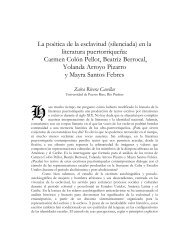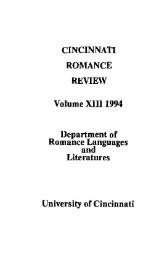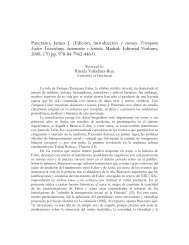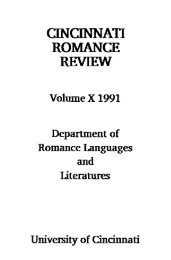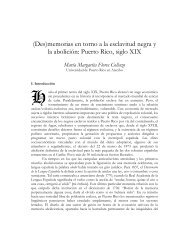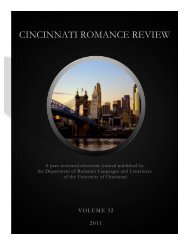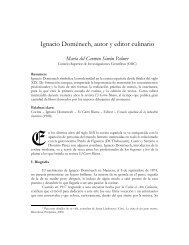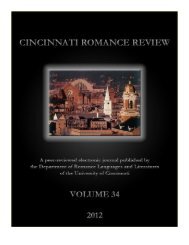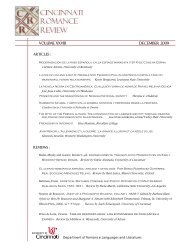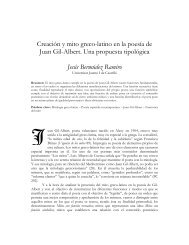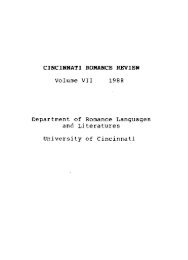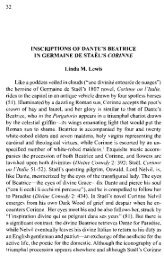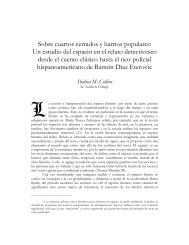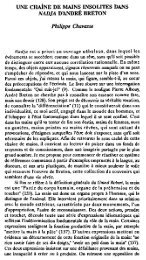Volume 30 (2011) - Cincinnati Romance Review
Volume 30 (2011) - Cincinnati Romance Review
Volume 30 (2011) - Cincinnati Romance Review
You also want an ePaper? Increase the reach of your titles
YUMPU automatically turns print PDFs into web optimized ePapers that Google loves.
128 DOSINDA GARCÍA ALVITE<br />
classical Greece to Equatorial Guinea in contemporary times. And beyond this type of<br />
changes, her transculturation also reveals itself as Afrocentrist and womanist. Her<br />
Antígona uses dance to create community and facilitate its healing, as in traditional<br />
African dances performed by women. Furthermore, the use of drums creates a proper<br />
African setting, and drum language supports and emphasizes the message of liberation<br />
of the play and becomes highly relevant to communicate to an orally educated audience.<br />
It is clear then, that for Trinidad Morgades Besari literature is produced on the belief<br />
that human condition can change, and her Antígona can work as a tool to transform the<br />
specific conditions of Equatorial Guinea.<br />
WORKS CITED<br />
Aydemir, Murat and Alex Rotas, eds. Migratory Settings. “Introduction. Migratory<br />
Settings.” 7-31.<br />
Bacon, Helen H. “The Chorus in Greek Life and Drama.” Arion 3.1 (1994-5): 6-24.<br />
Carlson, Marla. “Antigone’s Bodies: Performing Torture.” Modern Drama 46.3 (2003):<br />
381-403.<br />
Dearling, Robert, ed. The Illustrated Encyclopedia Of Musical Instruments. New York:<br />
Schrimer Books, 1995.<br />
Decalo, Samuel. Psychoses of Power: African Personal Dictatorships. Boulder: Westview Press,<br />
1989.<br />
Diala, Isidore. “Ritual and Mythological Recuperation in the Drama of Esiaba Irobi.”<br />
Research in African Literatures 36.4 (2005): 87-114.<br />
Dove, Nah. “African Womanism: An Afrocentric Theory.” Journal of Black Studies 28.5<br />
(1998): 515-39.<br />
Goff, Barbara and Michael Simpson. Crossroads in the Black Aegean. Oedipus, Antigone, and<br />
Dramas of the African Diaspora. Oxford: Oxford University Press, 2007.<br />
Guyomard, Patrick. “Antígona, para siempre contemporánea” Desde el jardín de Freud:<br />
revista de psicoanálisis 5 (2005): 68-77.<br />
Hudson-Weems, Clenora. Africana Womanism: Reclaiming Ourselves. 3rd rev. ed. Troy, MI:<br />
Bedford, 1995.<br />
Jackson, Robert H., Carl Gustav Rosberg. Personal Rule in Black Africa: Prince, Autocrat,<br />
Prophet, Tyrant. Berkley and Los Angeles: University of California Press, 1982.<br />
Lane, Jill. “Antígona and the Modernity of the Dead” Modern Drama 50:4 (2007): 517-<br />
31.<br />
Lewis, Marvin. An Introduction to the Literature of Equatorial Guinea. Between Colonialism and<br />
Dictatorship. Columbia and London: University of Missouri Press, 2007.<br />
Modupe Kolawole, Mary E. Womanism and African Consciousness. Trenton, N.J: Africa<br />
World Press, 1997.<br />
<strong>Cincinnati</strong> <strong>Romance</strong> <strong>Review</strong> <strong>30</strong> (Winter <strong>2011</strong>): 117-129.



